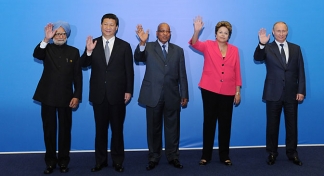Russia approves creation of IMF rival by BRICS nations

The new BRICS fund will have $100 billion, though it is formed only by five countries. Source: Alamy / Legion Media
The Russian government has signed a draft agreement on the creation of an analogue of the International Monetary Fund (IMF) by the BRICS nations.
According to the document, the countries’ dollar reserves will remain on the balance sheets of their central banks. However, these reserves can be made available at the request of one of the parties. In particular, as Vasily Yakimkin, senior lecturer at the Russian Presidential Academy of National Economy and Public Administration (RANEPA), explains, two substructures are planned for creation within the scope of the project.
Firstly, there is a stabilization pool with capital of $100 billion – a direct competitor to the IMF. The BRICS countries are to contribute at varying proportions: China - $41 billion, Russia - $18 billion, Brazil - $18 billion, India - $18 billion, and South Africa - $5 billion. Secondly, a new development bank will come into being with startup capital of $50 billion and each country will contribute $10 billion.
“As expected, the agreements on the creation of these structures will soon be signed at the summit of the heads of the BRICS countries in Brazil on July 15. The structures will start functioning in 2015,” says Yakimkin.
According to him, each of the BRICS nations is also seeking for the headquarters of these new institutions to be based accordingly in its respective country. Specifically, Brazil put together the charter treaty of the new fund, and Russia dealt with concluding the inter-governmental agreements.
Yakimkin says that the development bank credits will not be intended so much for the BRICS countries as for investing in various institutional or infrastructural projects in other countries, for example, on the African continent.
“If credit is given to some country for a development program, for example, in energetics, then the BRICS countries can place their equipment or their companies as the executors of the work as part of the deal,” says Yakimkin.
“That is, this project already allows the BRICS countries to promote their interests abroad, and this is a gateway to a new political and economic level,” he explains.
In turn, the new currency fund will be a “mutual aid fund” to be used including in the event that one of the BRICS countries encounters financial problems. Russia, India, and Brazil can count on a loan equal to their contribution to the pool, while, as a rule, China’s access to the liquidity is limited to half of its share.
“This project will significantly reduce the future volatility of the currency markets of these developing countries, which several months ago endured a serious downturn, and the IMF did not help,” says Yakimkin.
The slump in the currencies of the BRICS countries began in summer 2013 when the Brazilian real and Russian ruble dropped to four year lows in relation to the dollar, and the Indian rupee tumbled to a historic low.
According to Yakimkin, Russia, Brazil, and India have essentially sought guarantees under Chinese reserves. This will also support the national currencies of these countries and reduce future rates on loans in world debt markets.
Key impacts
The total volume of funds in the IMF is currently $369 billion, but the new fund will have $100 billion, even though it is formed out of just five countries.
“The decision of the BRICS countries on the creation of a supranational organization analogous to the IMF seems logical and correct. At the present moment in time, the IMF has become too unwieldy a structure and is hardlyreforming itself,” says Anton Soroko, an analyst from the investment holding company Finam.
In particular, according to him, the U.S. is blocking the recapitalization of the IMF by developing countries, since if this situation comes about, the influence of the world’s leading economies on decisions made in the fund will decrease.
Moreover, according to Vasily Yakimkin, the lending of infrastructural and investment projects in developing countries within the framework of the IMF takes place with delays and less than fully, whereas interest for loans is usually overestimated.
“The most important thing is for the new organization not to suffer from the same problems that the IMF has – otherwise it will just be an attempt to gain control over the supranational economic superstructure,” says Anton Soroko.
“I think that the parallel existence of these structures may bring benefits as they will one way or another start to compete for member-participants, which will push them to the more thoughtful evaluation of problems, and consequently, their solutions,” he adds.
Read more: Putin makes “historic” visit to Latin America
All rights reserved by Rossiyskaya Gazeta.
Subscribe
to our newsletter!
Get the week's best stories straight to your inbox

